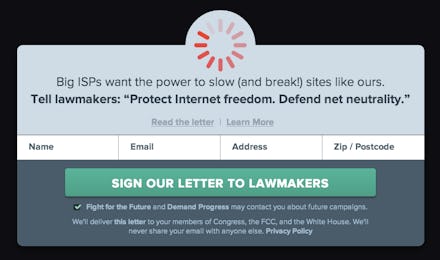Here's Why You're Seeing a Strange Message On Your Favorite Websites Today

You might have noticed on Wednesday a "spinning wheel of death" on major websites like Netflix, Tumblr, Reddit and Digg. But don't worry: Your Internet speed isn't actually slowing down. The banners are part of a push to protect net neutrality.
Sept. 10 has been designated as a day of "Internet Slowdown" in the Battle for Net Neutrality. All day, prominent websites and organizations — including the ACLU, WordPress.com, Vimeo, Meetup and Kickstarter — have added messages to their websites asking visitors to contact their lawmakers and the Federal Communications Commission in support of net neutrality.
Net neutrality is the principle that internet service providers — essentially the largest cable companies —must provide data at the same speed to all websites. The FCC had protections in place to keep the Internet open, but in January, a federal court ruled the FCC had gone too far, and struck down the rules enforcing net neutrality. Since then, the FCC has proposed new rules that would make it legal for internet service providers who pay more to receive faster service. Many fear that these pay-to-play "fast tracks" will make the Internet a much less equitable place, stifling innovation and hurting startups that can't pay for higher speeds.
The debate has received significant attention despite the fact that it is — as John Oliver recently opined on his show Last Week Tonight — an issue that is difficult to understand and easy to ignore. His segment on net neutrality crashed the FCC's comment page.
The period for the public to add their thoughts to the 1.2 million comments on the FCC's proposed rule change ends Monday, which has led activists to make their final push for net neutrality.
Beyond the focus on how net neutrality could affect Internet innovation and speed, some lawmakers, such as Sen. Al Franken (D-Minn.), have characterized the open Internet as the "First Amendment issue of our time."
"Do we want deep-pocketed corporations controlling what information you get at what speed?" Franken asked in July. "All this innovation hasn't happened just while we've had net neutrality, it's happened because we have net neutrality."
Online journalists, particularly independent blogs and bloggers, have been active in voicing their concerns about how the end of net neutrality could limit access to their work and open information sharing that has always occurred on the Internet.
While many of the organizations participating in Wednesday's slowdown are tech companies, popular media cites and blogging platforms, the list also includes organizations concerned with representation, media and First Amendment issues. WAM! (Women, Action, and the Media), Lesbians Who Tech, the Center for Media Justice and ColorOfChange.org are among the sites participating.
Their stake is understandable, given growing trends in online activism centered on race and feminism. Keeping the Internet free and may be important to these groups as they continue to articulate how hashtags and @handles can evolve along with traditional methods of movement building and involve more people, old and young, in activism.